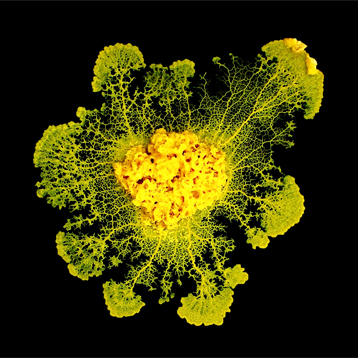Found this interesting. Learning without a brain. Maybe neurons are just specialized in doing something that all cells can do: learn.
A single-celled organism capable of learning
CNRS, Feb. 2016
For the first time, scientists have demonstrated that an organism devoid of a nervous system is capable of learning. A team from the Centre de Recherches sur la Cognition Animale (CNRS/Université Toulouse III – Paul Sabatier) has succeeded in showing that a single-celled organism, the protist Physarum polycephalum, is capable of a type of learning called habituation. This discovery throws light on the origins of learning ability during evolution, even before the appearance of a nervous system and brain. [...]
An ability to learn, and memory are key elements in the animal world. Learning from experiences and adapting behavior accordingly are vital for an animal living in a fluctuating and potentially dangerous environment. This faculty is generally considered to be the prerogative of organisms endowed with a brain and nervous system. However, single-celled organisms also need to adapt to change. Do they display an ability to learn? Bacteria certainly show adaptability, but it takes several generations to develop and is more a result of evolution. A team of biologists thus sought to find proof that a single-celled organism could learn. They chose to study the protist, or slime mold, Physarum polycephalum, a giant cell that inhabits shady, cool areas and has proved to be endowed with some astonishing abilities, such as solving a maze, avoiding traps or optimizing its nutrition. But until now very little was known about its ability to learn.
During a nine-day experiment, the scientists thus challenged different groups of this mold with bitter but harmless substances that they needed to pass through in order to reach a food source. Two groups were confronted either by a "bridge" impregnated with quinine, or with caffeine, while the control group only needed to cross a non-impregnated bridge. Initially reluctant to travel through the bitter substances, the molds gradually realized that they were harmless, and crossed them increasingly rapidly—behaving after six days in the same way as the control group. The cell thus learned not to fear a harmless substance after being confronted with it on several occasions, a phenomenon that the scientists refer to as habituation. After two days without contact with the bitter substance, the mold returned to its initial behavior of distrust. Furthermore, a protist habituated to caffeine displayed distrustful behavior towards quinine, and vice versa. Habituation was therefore clearly specific to a given substance.
Habituation is a form of rudimentary learning, which has been characterized in Aplysia (an invertebrate also called sea hare). This form of learning exists in all animals, but had never previously been observed in a non-neural organism. [...]
http://www2.cnrs.fr/en/2751.htm

The slime mold Physarum polycephalum (diameter: around 10 centimeters), made up of a single cell, was here cultivated in the laboratory on agar gel.